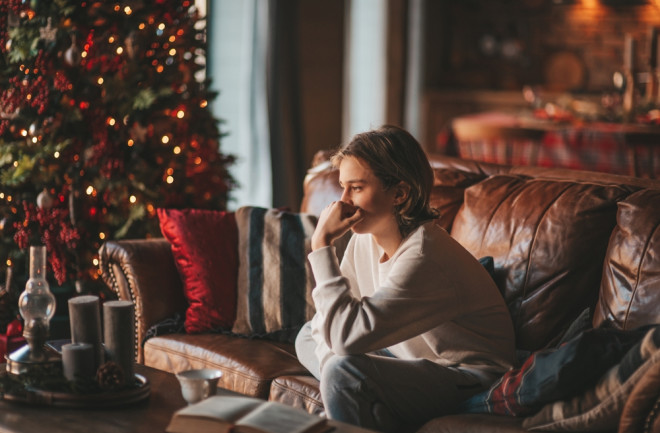The holidays can be a heavy time of year. They can remind us of sadness when we’re grieving the loss of a loved one. They can remind us of what we don’t have if money is tight or we’ve lost a job. And for those who don’t have people to celebrate with, the holidays can highlight the loneliness we may already be feeling.
Psychologist and grief expert Jill A. Harrington says that calling our emotions negative isn’t always accurate because our feelings can be a reaction to a difficult time. “These emotions are appropriate, and we may be perceiving them as negative because we’re told we’re supposed to feel a certain way during the holidays,” says Harrington.
Why Are the Holidays So Hard?
We’re told over and over again that it’s the “happiest time of year,” which makes us feel even worse if we’re not feeling this way. Social programming is telling us that this is a time of joy and cheer when everything should be going our way, and oftentimes, this isn’t the case. “The holidays can put the loss that’s already in your life right in your face,” says Harrington.
Read More: ’Tis the Season To Feel Stress and Sadness
Dealing With Loss During the Holidays
Traditions need to be adjusted when someone dies, which can further remind us of the loss we’ve endured. If a parent has passed and you’re no longer celebrating Christmas at their home, that highlights the pain. “It’s not only the physical loss of a loved one, but all the ‘secondary losses’ that go along with it,” says Harrington.
What Is Grief?
Grief is a reaction to loss, which means it can come in the form of death but also in not having the things that you once had or wish you had. For example, it can make us feel like we don’t have the money to buy our loved ones the things we wish we could. Additionally, for those who wish they had a partner or children to celebrate with and haven’t found that yet, there’s also a sense of not living up.
“These types of grief are called ‘non-death losses,’” says Harrington.
The Difference Between Grief and Depression
It’s important to note, says Harrington, that grief and depression aren’t the same. She calls the depressed emotions that we feel as a result of grief ‘small d depression,’ but that’s very different from clinical depression.
Depressive feelings as a result of loss are appropriate emotions, but clinical depression is a severe form of depression that’s the result of a mood disorder that causes persistent feelings of depression along with a lack of interest in living your life.
Read More: The Traumatic Loss of a Loved One Is Like Experiencing a Brain Injury
What Are Feelings of Compare and Despair?
Seeing other people’s highlight reels over the holidays on social media can cause even more pain, says Gina Moffa, a grief expert and author of Moving on Doesn’t Mean Letting Go. Financially, you might not feel like you can keep up or do the things that other people can do.
She calls it ‘compare and despair,’ or making ourselves feel worse by constantly comparing our lives to others. It causes us to feel lonely all year round, but it’s especially potent during the holidays. “We’re constantly looking at what other people have, and we compare it with what we live with day to day,” says Moffa.
Read More: What You Can Do About Seasonal Depression
How to Cope with Grief During the Holidays
Moffa says that being prepared for the negative feelings we might feel over the holidays is her number one piece of advice. Do what you can to take the pressure off so you’re not feeling anxious leading up to the holidays.
Allow Yourself to Grieve
For example, if you’re grieving, you might not be able to do the things you’ve done in the past, like travel to family or host, and being upfront about that makes it easier when the holidays arrive. “Give yourself permission to do less and take time for yourself,” says Moffa.
Ask for Support
Do what you can to take the pressure off ahead of time by planning for others to take on some of your holiday duties like shopping, cooking, traveling, or sending holiday cards. Or if you don’t have someone to help you, try not doing the things that cause you extra pressure might be the best choice.
Limit Your Alcohol
Additionally, says Moffa, give yourself time to feel your feelings rather than trying to avoid them. Alcohol, which seems ever present during the holidays, is often a tool for avoidance, but it can make the problem even worse. Still, she says, if you do slip up and find yourself overindulging at a holiday party, that’s okay too. Don’t spend too much time dwelling on what you could have done better.
In the end, it’s about giving yourself some leniency at a time of year when you might be triggered. After all, says Moffa, the holidays really are just another day of the year. “It’s what we build them up to be that creates the problem,” she says.
Read More: Why Getting Gifts for the Holidays Feels Stressful

